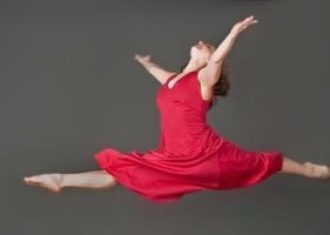Dance Review: Sokolow Now! — Continuing The Legacy
Anna Sokolow’s art was the gift of distillation, designed around the choreographic mot juste and saying only that and nothing else. Performed by the right dancers, adequately coached, that simplicity can be resonant.
Sokolow Now! in Black & White. At Boston University Dance Theater, Boston, MA, September 15.
By Debra Cash
Choreographers’ legacies after they die depend on an alignment of discerning planning and sheer star-aligning luck.
When Anna Sokolow died at the age of 90 in March 2000, she had the forethought (and the horrific example of the chaos that descended on creative estate of Sokolow’s mentor, Martha Graham, 10 years earlier) to leave the rights to her concert dance repertory to two dancers who had been her disciples for more than 30 years. This couple, Lorry and Jim May, had worked with Sokolow at Julliard where she was a respected, if feared, teacher and performed with and co-directed her final troupe, the Players Project. By the time she passed away, the Players Project was in many ways marginal to the contemporary New York dance scene, but Sokolow had never cared about fashion anyway, and the company’s continued existence honored her standing as a member of American modern dance’s pioneering generation, her internationalist outlook, and her humane progressive political and social commitments.
Jim and Lorry May inherited the rights, but within a few years had established separate Sokolow legacy organizations. I don’t know the details of their split, but I can’t imagine it was easy or pretty. Jim May’s organization, Sokolow Theatre Dance Ensemble, based in New York, performs Sokolow’s work alongside work by living choreographers Jim May feels have an affinity for Sokolow’s style or political and literary themes. Lorry May’s Attleboro, Massachusetts-based troupe, Sokolow Now! dances the works of Sokolow exclusively, as the most visible face of a foundation charged with licensing and reconstructing her works, primarily at colleges. That troupe presents an annual performance at Boston University.
Sokolow’s art was the gift of distillation, designed around the choreographic mot juste and saying only that and nothing else. Performed by the right dancers, adequately coached, that simplicity can be resonant. (Risa Steinberg, who danced with the Players Project, has danced a bone-chilling rendition of Sokolow’s Kaddish.) This past weekend’s Sokolow Now! program of dances from the 1980s alas, did not add luster to Sokolow’s reputation.
The social commentary of Everything Must Go, set to the dour saxophone blues of Teo Macero, one of her regular musical collaborators, introduces us to group of nameless, homeless types scrabbling among black plastic bags of garbage. Where it should be inspiring pity and empathy, it merely generated giggles. The primping of the young party girls in another section would have looked clichéd when it was created and now looks decidedly phony, the product of some finger-wagging grandmother telling the gals to go back in, change into something decent. (Oddly enough, Sokolow had contributed the choreography for the original version of Hair, although in one of those classic Broadway shakeups, she was dismissed before the Broadway opening. Let the sun shine in, indeed!) The Homage to Rachmaninoff reflects Graham in its female solidarity and formalism—this homage could be a riff on Martha’s Chronicle. Each abbreviated solo is an exercise in restrained imagery: Kirsten McKinney basked in an invisible sun, chest raised, arms outspread, while Tabitha Liversidge hopped lightly with rhythmic discernment and softly shifting arms.
Sokolow’s From the Diaries of Franz Kafka, relatively familiar here from its 2010 staging by Jim May for Boston Conservatory dance students, is a reminder that Sokolow was a founding member of the Actors Studio and a longtime teacher of movement for actors. Kafka is a series of vignettes separated by blackouts, where global horror is foreshadowed by the rigid postures and social formations of gossip in a pre-war European parlor. The Sokolow Now! dancers’ rocking, falling and stamping seemed like the simpleminded amplification of famous quotes instead of shapes hewn out of wordlessness, and Kafka’s genius was reduced to the whining of an unhappy son of the Jewish bourgeoisie who feels like he’s being treated like a cockroach. All of which reminded me of something Sokolow is reported to have said: “I don’t have a dim view of humanity. But I don’t have that happy philosophy, because what the hell is there to be happy about?”
Debra Cash, Executive Director of Boston Dance Alliance, www.bostondancealliance.org, is a founding Senior Contributor to The Arts Fuse and a member of its Board of Directors. In 2017 she was honored as Champion of the Arts by OrigiNation Cultural Arts Center.
c2012 Debra Cash

